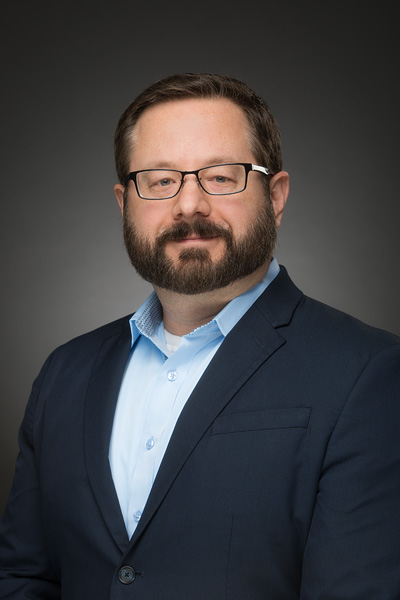The “Happiest” Time of the Year: Grief and the Holidays

The holidays are filled with messages of family, friends, joy and celebrations. It’s on every advertisement we see, in every store we shop - everywhere is the commercialization of the warm, happy feelings you “should” be feeling during the holiday season. But what if this season brings different emotions and associations for you? Feelings of grief may plague you during the “happiest” time of year, and we’re here to tell you that’s okay. It’s normal, and there are ways to cope and maybe even thrive.
To walk us through understanding grief and better coping mechanisms, we sat down with Dr. David Pfaff, Ph.D., LPC. He is core faculty for the Clinical Mental Health Counseling program at TTUHSC, working remotely out of Oklahoma City. For 11 years, Dr. Pfaff has been a licensed professional counselor, working in community health centers and university counseling centers with children and adults. He has also operated his own private practice since 2021.
Grief is a natural process.
While grief is a natural process, it can be a challenge when we are “told” we should be feeling happy. In fact, this emotional power struggle can even bring on grief, magnifying the disparity in how we actually feel versus how we are supposed to feel. As for grief and the holidays – Dr. Pfaff notes – the two can often be synonymous as the holidays naturally remind us of what we’ve lost.
Comparison is the thief of joy.

“We try to avoid these feelings through problematic substance use or otherwise, or we might think that our problems are gonna be a burden to other people,” Dr. Pfaff says. “It's a time of year that we can get mired in those self-judgments as we're feeling isolated and not as happy as we ‘think’ we should be.”
Grieving is a product of love.
“I tell my clients there's a ‘cure’ to grief,” Dr. Pfaff says. “Because we feel like we need to fix our grief, I tell them the ‘cure’ to grief is to stop caring about what you're grieving. But no one wants to do that, right?”
He explains that grieving is actually a product of love – a product of having very special things in our lives that we don't have anymore. So, grieving is in a way honoring that which we love(d).
“So, when we start to realize we're struggling and see grief as problematic, we try to minimize and invalidate it or get rid of it,” he says. “We love to try to fix our emotions, but the more we try to do that, the more we tend to get mired and precipitated by it. And at some point, it's not grief anymore, it's our struggle with grief.”
Know the warning signs.
It’s at that point, Dr. Pfaff explains, that we start to feel like we are losing our ability to function. We find ourselves in a place where grief is getting in the way of work or in the way of relationships. It's getting in the way of our ability to sleep and eat. It's making it even more difficult to not just thrive in life, but to feel like we're surviving.
Tangible warning signs are isolation, consistent low mood, loss of function in multiple domains of life (work, relationships, self-care, hygiene), difficulty feeling pleasant emotions and having pleasant experiences.
Know the function and context of grief.
Dr. Pfaff says it’s important and helpful to understand that grief is not a problem – it has a function and a context – it means we love, we're missing something we love, and we've had something very special in our life.
“If we can normalize it, universalize it, consider the stages of grief, name what we’re feeling, and recognize that we’re having a difficult time, it can make a difference,” he says. “Sometimes it’s just about giving yourself permission to survive and allowing yourself to feel, then it makes it easier to appreciate those times when you can thrive.”
Key ways to work through grief:
Mindfulness – Dr. Pfaff notes the name acronym – noticing the feeling, acknowledging it, making space for it, and then expanding and putting it into context. Then leaves space to find ways to still cultivate pleasant, engaging, meaningful experiences.
Social Supports – He says quality over quantity is most important here. Especially during the holidays, it’s important to note that if you’re not close with family members, you can create families of choice.
Faith and spirituality – If you’re not spiritual, there are also secular communities that you can explore.
Counseling – Know when to ask for help. TTUHSC Students have access to the counseling center, there is therapy assistance online, and there are free support groups. Students can get eight free sessions.
Dr. Pfaff says it can take eight years on average before people seek mental health services. Please don't wait.
Other Helpful Resources:
- Harvard Gazette link: Link to article
- TedTalk by the study director: Link to TedTalk
- The published Book: Link to Amazon listing
- Article from the Atlantic: Link to article
Book recommendations:
- Alan Wolfelt, Healing Your Holiday Grief: 100 Practical Ideas for Blending Mourning and Celebration During the Holiday Season
- Alan Wolfelt, Grief One Day at a Time
- Leanne Friesen, Grieving Room: Making Space for All the Hard Things after Death and Loss
- Elisabeth Kübler-Ross and David Kessler, On Grief and Grieving
Related Stories
The John Wayne Cancer Foundation Surgical Oncology Fellowship Program at Texas Tech University Health Sciences Center Announced
TTUHSC is collaborating with the John Wayne Cancer Foundation and has established the Big Cure Endowment, which supports the university’s efforts to reduce cancer incidence and increase survivability of people in rural and underserved areas.
Making Mental Health a Priority in the New Year
Sarah Mallard Wakefield, M.D., a psychiatrist with Texas Tech Physicians, talks about strategies to combat widespread and growing anxiety.
TTUHSC Dean to be Inducted into the National Academies of Practice as Distinguished Fellow
Gerard E. Carrino, Ph.D., MPH, dean of the TTUHSC Julia Jones Matthews School of Population and Public Health, will be inducted into the National Academies of Practice (NAP) as a Distinguished Fellow of the Public Health Academy.
Recent Stories
The John Wayne Cancer Foundation Surgical Oncology Fellowship Program at Texas Tech University Health Sciences Center Announced
TTUHSC is collaborating with the John Wayne Cancer Foundation and has established the Big Cure Endowment, which supports the university’s efforts to reduce cancer incidence and increase survivability of people in rural and underserved areas.
TTUHSC Receives $1 Million Gift from Amarillo National Bank to Expand and Enhance Pediatric Care in the Panhandle
TTUHSC School of Medicine leaders accepted a $1 million philanthropic gift from Amarillo National Bank on Tuesday (Feb. 10), marking a transformational investment in pediatric care for the Texas Panhandle.
Texas Tech University Health Sciences Center Permian Basin Announces Pediatric Residency Program Gift
TTUHSC Permian Basin, along with the Permian Strategic Partnership and the Scharbauer Foundation, Feb. 5 announced a gift that will fund a new pediatric residency.
